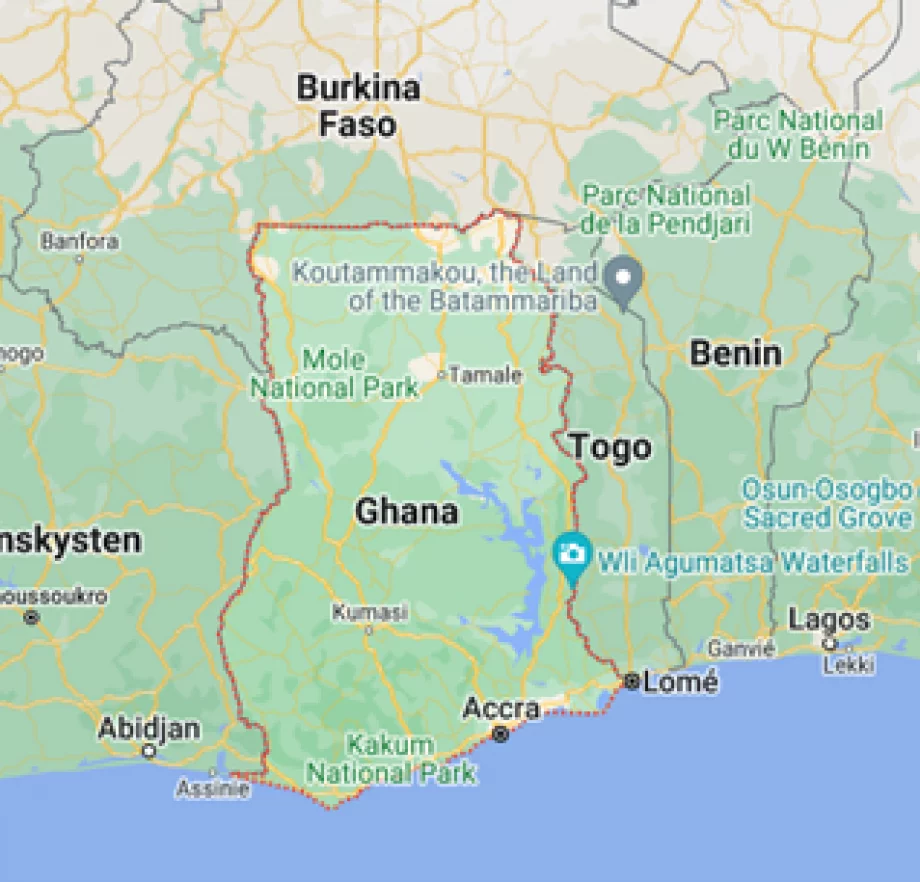
Ghana, with a population of 33 million people, is one of the main Anglophone countries of West Africa. Centrally located on the coast, it has easy and safe travel access, and has now enjoyed political stability for a long time.
So far, most of our efforts have been focused on eastern sub-Saharan Africa, so we have now been looking at locations in the west. Calabar in Nigeria is also under negotiation, primarily by Akwi Asombang and Alanna Ebigbo, members of our Outreach Committee, who have separately been engaged at that location. Prof. Aabakken had knowledge of and connections in the Ghanaian capital, Accra through numerous previous visits, adding to the relevance of looking at this as a potential location for another WEO training center. Thus, between visits to Senegal and Addis Ababa in Ethiopia in January 2024, we spent three days in Accra to evaluate the situation and potential at this location.
Hospitals
Unlike most previous locations that have been evaluated, the situation in Accra lends itself to a potential joint effort between several hospitals. These units have very diverse characteristics and will be described separately below, followed by a consideration of how their joint participation might offer a valuable opportunity for WEO collaboration.
Korle-Bu Teaching Hospital
This is the main university hospital in Ghana, with comprehensive medical and academic capacity. It is entirely public and has a long history, having recently celebrated its 100th anniversary. It is currently the only accredited facility for GI and endoscopy training in Accra; hence all the doctors are trained here.
The endoscopy unit is part of and run by the surgical department, with Fridays designated for endoscopy by gastroenterologists. A separate unit was recently developed within the medical department of gastroenterology; however this is currently not operational due to issues with internal/external funding and equipment repair problems. Thus, after a 2-year period of independent, full-week operation for medical gastroenterology, the model is back to one-day-a-week operation within the surgical department.
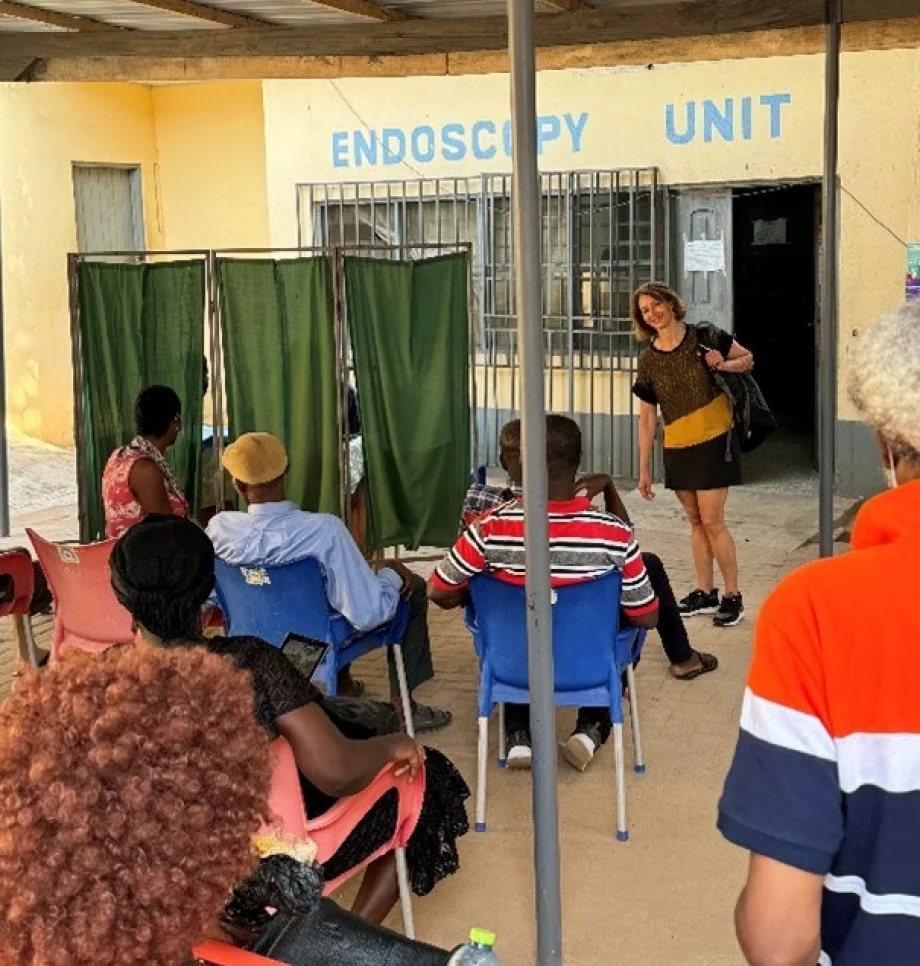

The unit has two endoscopy rooms, but one is currently not opoerational because of the breakdown of one tower. Thus at the moment there is a room with an Exera III tower, one operational gastroscope (another upper endoscope has gone for repair due to electronic issues), and two colonoscopes. Also, one ESG 300 diathermy unit is available.
The unit is small, the patient waiting area is outside, and there is flooding during the rainy season. There is minimal additional space for staff, administration, or even storage. There is no place for educational activities. There is no wifi access. The unit is basically unchanged since Prof. AaBakken’s previous visits 20 years ago, down to the broken cupboard door that is still broken. The prospect of establishing ERCP/EUS at Korle-Bu is quite uncertain, given the trajectory of the unit during the past decades.

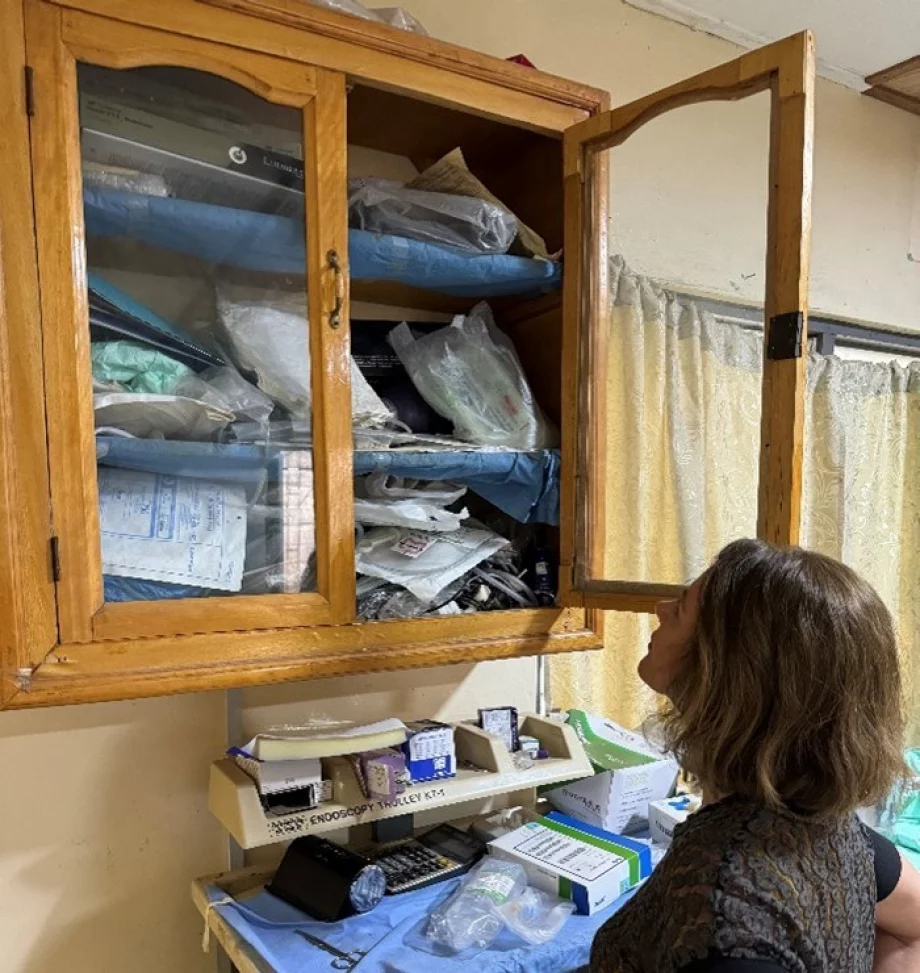
On the day of our visit, a total of eight procedures were planned, and we watched two: one gastroscopy performed by a fellow, one diagnostic-only colonoscopy performed by a newly qualified consultant. It seems that, band ligation is done as needed, and only by gastroenterologists. Bands are available, but at a cost of around 50 USD for the patient (Chinese brand barrel/band/thread sets). Other therapies (dilations, bleeder management, polypectomies) are done primarily by surgeons. The medical–surgical collaboration seems acceptable at a personal level, but gastroenterology activity does need to expand.
Despite the extremely basic setup at the endoscopy unit, it appears that most of the endoscopy training in Ghana is at Korle-Bu. There are four medical fellows in training at any time and the program includes dedicated endoscopy training, while for surgeons, training was a less structured part of the general surgical residency. The hospital also has a dedicated purpose-built training center (MSSI; Medical and Surgical Skills Institute), primarily designed for laparoscopy and endoscopy model and wet-lab training, with a setup also for live pig surgery. During previous training courses, this facility has been excellent for non-hands-on components of training.
Nova Surgical Center (NSC)
In collaboration with a private hospital in the center of Accra, Dr. Lewis Roberts, a Ghanaian hepatologist working at the Mayo Clinic, Rochester, United States, has established this quality endoscopy unit fitted with donated equipment from the US. It comprises one endoscopy room with a 180 series Olympus tower, two gastroscopes and two colonoscopes, quality disinfection facilities with a machine bought and awaiting installation, storage space, and consultation rooms. The planned expansion to another room with ERCP and EUS setup depends on provision of additional equipment yet to be acquired. Currently, the only endoscopist is a consultant from Korle-Bu Hospital (Dr. Akosua), who performed the very first upper endoscopy there when we were visiting. The center boasts good wifi connectivity offering ample opportunity for remote tutoring.
The center will be run by the US consortium, led by Dr. Roberts, aiming to supply further donations, regular visits by US endoscopists, and local faculty recruitment in addition to Dr. Akosua. The center is also foreseen as a training facility for advanced procedures. Dr. Dixon who owns the hospital has himself done a variety of training for ObGyn laparoscopy using this model and is committed to the program. Although the initiation of the center is donation-based, the long-term plan is for a self-funding endoscopy center.
The concept is the creation of an endoscopy training center that is self-funded from private charges at a discounted rate to patients. At Korle-Bu, the cost to the patient for an upper endoscopy is 700 Ghanaian cedi (GHC) (about 60 USD), while the cost at Nova is 2000 GHC (about 154 USD) plus consumables. This compares competitively with around 15 000 GHC (about 1154 USD) at most other private facilities, making the procedure affordable for many middle-class Ghanaians. The quality of the facilities is surely better than, and the quality of staff and service probably similar to that of Korle-Bu Hospital. The prospect of actually setting up advanced endoscopy is probably better than for Korle-Bu, but the access to trained medical personnel may be the limiting factor. A possible combined effort with Korle-Bu in that respect may be an option: for example, one of the fellows at Korle-Bu is presently on an 8-month training fellowship in Japan to learn ERCP and will need a place to practice on return. The head of gastroenterology at Korle-Bu, Dr. Adwoa Adjei, is also planning a similar fellowship during the coming year.

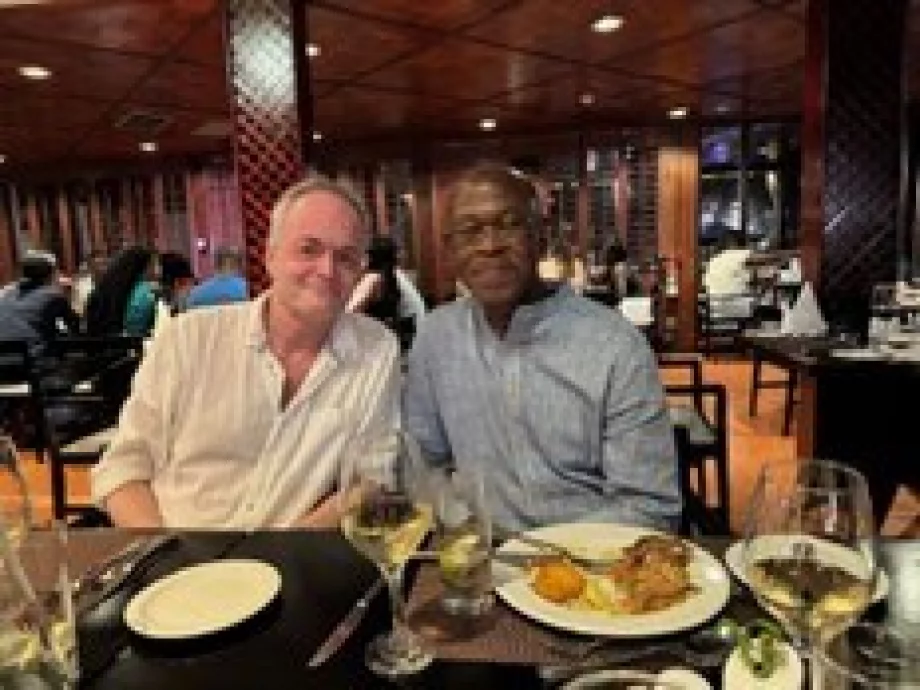
University of Ghana Medical Center (UGMC)
The University of Ghana at Legon, Accra, is a huge campus, measuring 9 km across and hosting 35 000 students. The medical college opened its hospital facility around 5 years ago; the endoscopy unit opened even more recently. Endoscopy is performed by two surgeons and a gastroenterologist, Dr. Amoako Duah, who was hired 3 years ago. Dr. Boamah did his training at Korle-Bu 3 years prior to starting at UGMC remains connected to Korle-Bu faculty.
This facility was truly impressive, with state-of-the-art facilities even better than those of Canberra or Oslo. There were two endoscopy rooms, although one was not yet opened because of the lack of another tower. Plenty of operational endoscopes (190 series) were available – and a service contract with Olympus that included loaning of instruments during repairs. We observed three procedures, all very well performed with excellent nursing staff. Electronic reporting software was in place, with rudimentary structured reporting, but excellent endoscopic image storage and connection with the hospital-wide electronic medical records. There was good Wi-Fi connectivity.
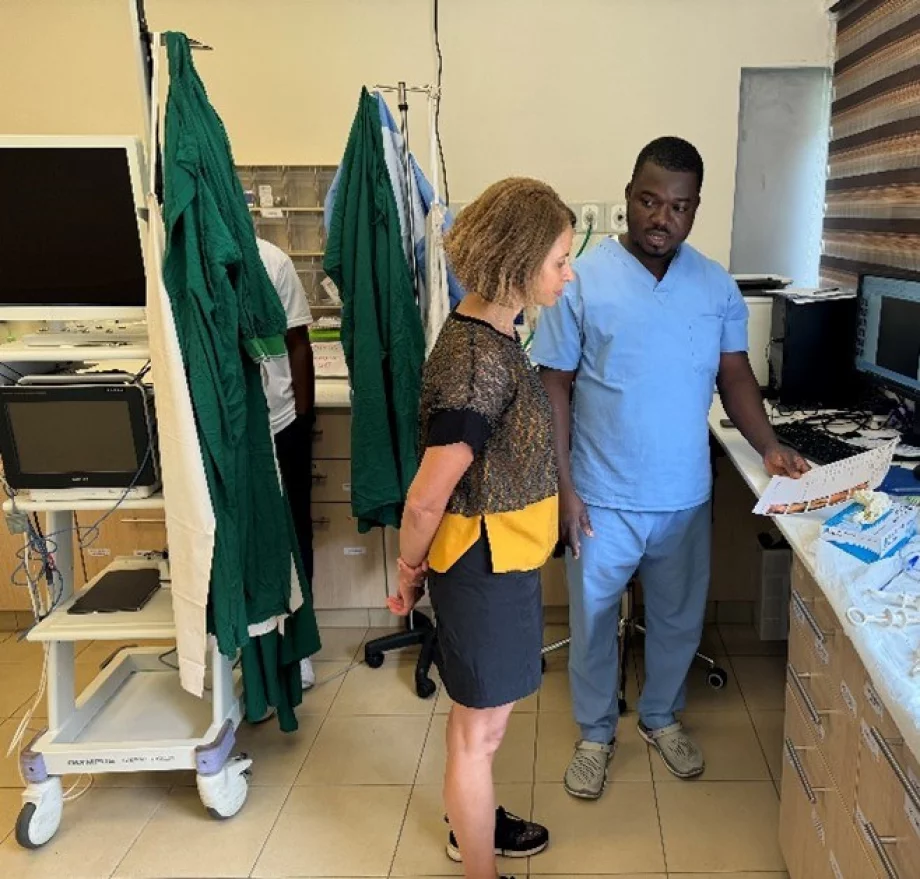
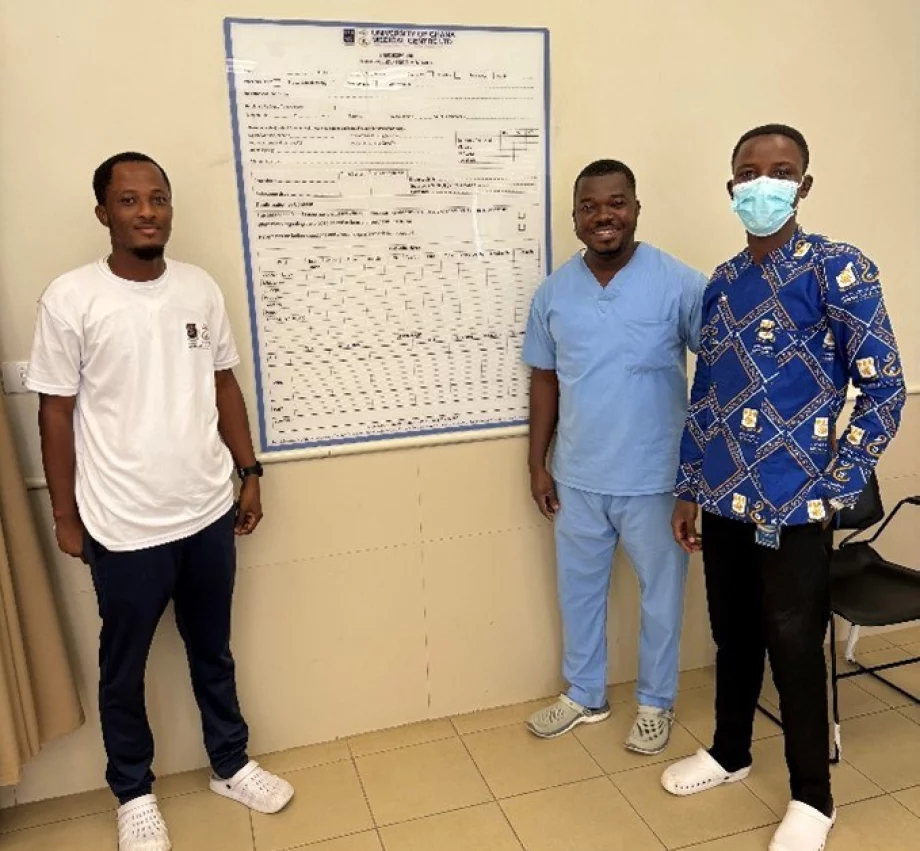
Current reported activity was around 40 procedures per week. Two thirds of these were gastroscopies, and most were level 1 or 2 procedures, including the work of two surgeons who were also doing endoscopy.
We met with the CEO of the hospital, Dr. Kwame Anim-Boamah who was knowledgeable about the endoscopy unit. There are strong ambitions for expanding training activities at the hospital, starting with a one-week visit last year from a group from Leicester, UK, who were training around 20 gastroenterologists from across Ghana. (There was some uncertainty about the continuation of this arrangement.) UGMC also had plans to establish advanced endoscopy (ERCP and EUS), and although this was not yet budgeted, given the rest of the setup this appears quite feasible. The need for trained staff to provide the service is again a major challenge that must be addressed.
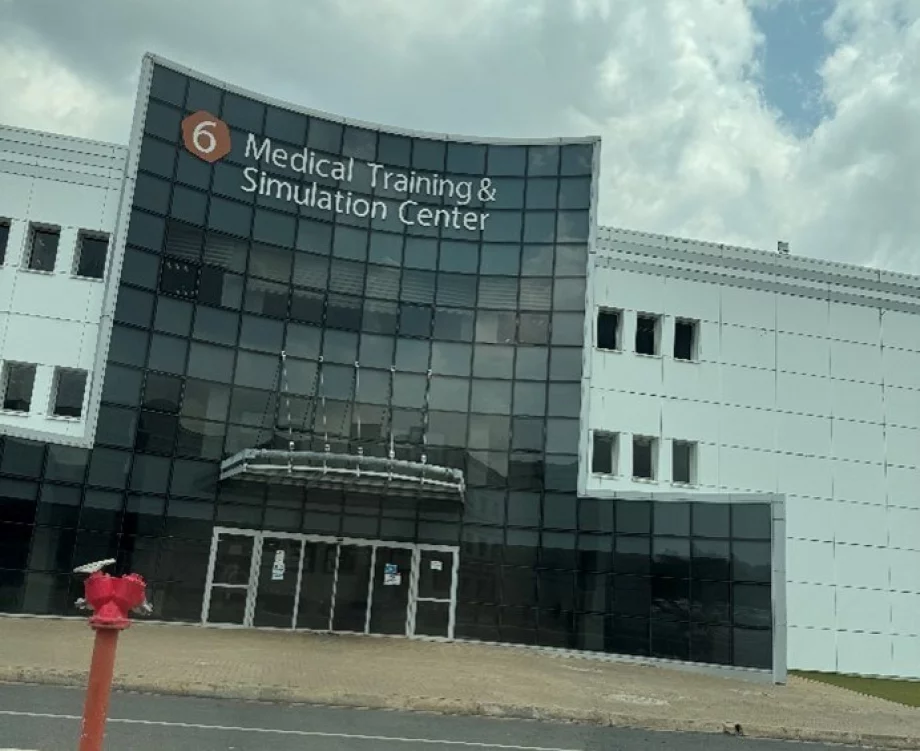
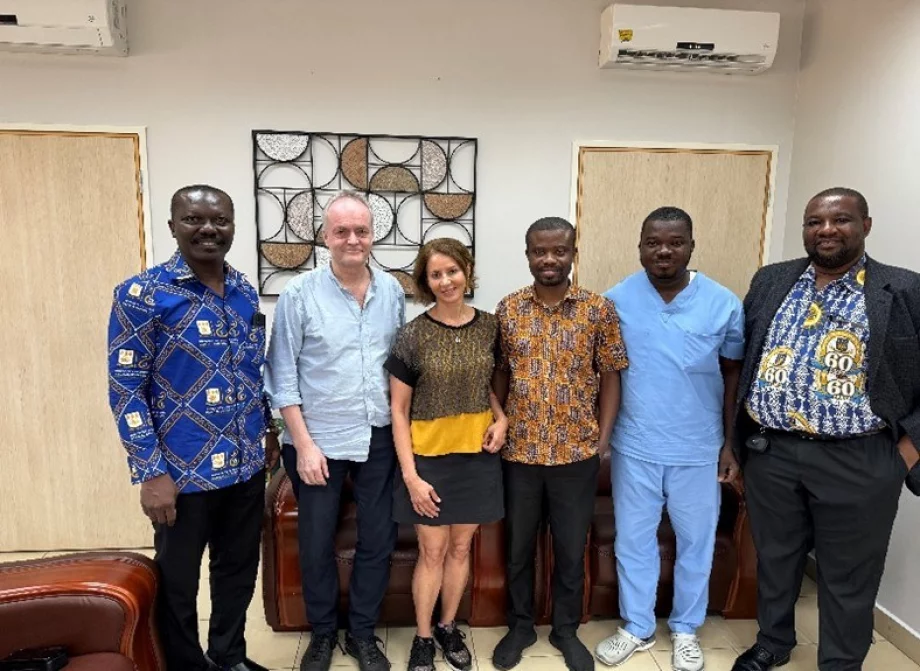
Possible ways ahead
Unlike most other centers, Accra offers the opportunity of a collaborative model between the three locations, based on their differing opportunities and limitations. The inherent links between them, with staff well-known to one another, may facilitate a joint model. Further discussions are planned with the medical and surgical faculty at Korle-Bu, together with the leadership, to possibly facilitate further investment in the endoscopy unit. At the Nova Surgical Center we will discuss with Dr. Roberts the timeline for expansion to ERCP and EUS, as well as their own plans for visiting faculty. Finally, the UGMC has great but underutilized facilities. We will connect with the group from Leicester to clarify the plans for further visits from their side; they may well represent an important collaborative partner.
Conclusion
Accra, as an Anglophone West African location lends itself very well to becoming a regional WEO training center. The potential for development of this location is highly dependent on the success of collaboration between the different facilities: no single one is sufficiently advanced to offer the whole package. Korle-Bu lacks infrastructure and funding but offers education and certification; NSC offers facilities but is small and currently has limited educational capacity; UGMC has the most advanced infrastructure and some educational facility but is not accredited for a GI training program. Thus, steps to establish a WEO training center in Accra will need to consider a different type of model that includes agreements between the sites to optimize the focus of WEO’s efforts. Prof. Aabakken will follow up our visit by approaching the centers in the next few months.